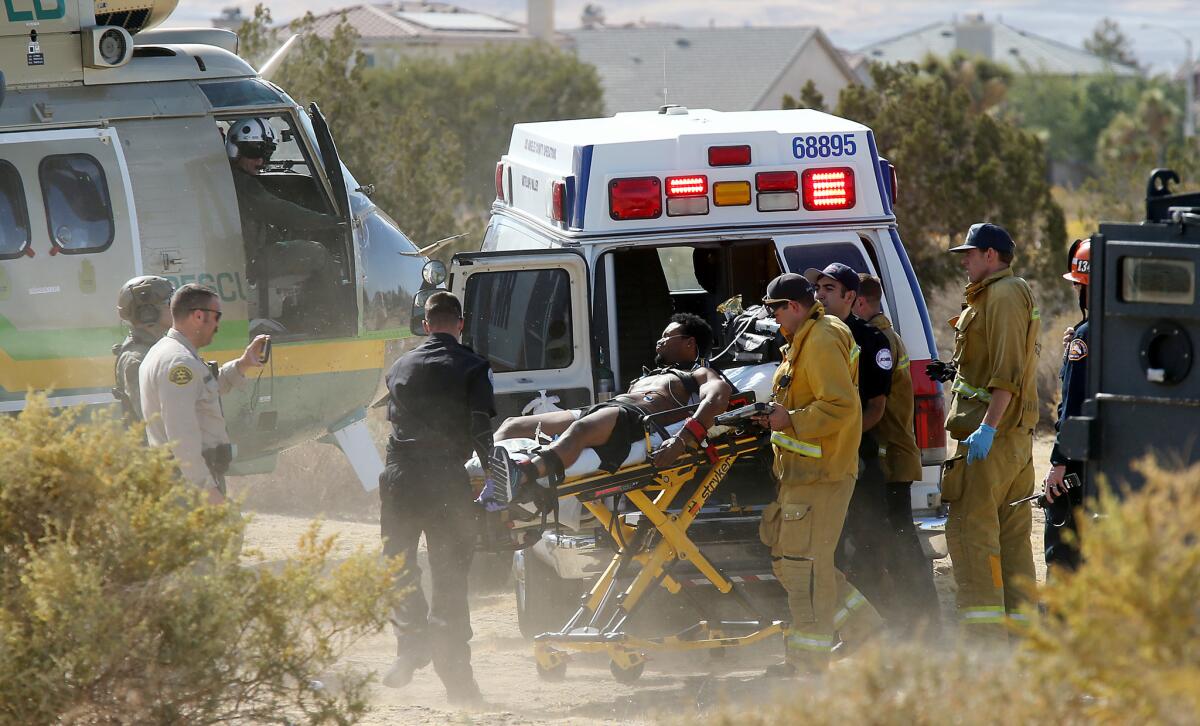‘I thought for a second he was going to shoot me’: Victim recalls robbery with gunman in deputy killing

A former USC community safety officer who was robbed at gunpoint years earlier by a man who authorities say shot and killed a Los Angeles County sheriff’s sergeant this week said in an interview that he feels lucky to be alive.
Elliott Coney, 34, learned that his former assailant had been named as the sergeant’s killer in a voicemail message left by a Times reporter asking about the Dec. 7, 2008, robbery.
Coney said he was at first unnerved by a message mentioning the robbery, wondering if the man was out of custody.
Authorities on Thursday identified the gunman who killed the sheriff’s sergeant in Lancaster as Trenton Trevon Lovell, 27, who was on parole. In 2009, Lovell pleaded guilty to robbing Coney near the USC campus and was sentenced to six years in prison.
“It puts things into perspective, how blessed I am,” Coney said of this week’s events. “It’s definitely alarming looking back.”
The day of the robbery, Coney had been celebrating his 27th birthday and dropped off a friend at USC where he was working as a community safety officer and studying to complete his master’s degree in college administration.
Suddenly, he saw several police cruisers with lights and sirens coming from behind him. He pulled over to let them pass. As he sat in his car about a half-mile away from the USC campus, the passenger door suddenly swung open and Lovell entered.
Lovell, he said, pointed a gun at his chest and demanded cash and his personal belongings.
Coney said he tried to reason with the gunman, whom he had seen before around the campus.
He explained to Lovell that it was his birthday and he had just spent a large amount of money and didn’t have any more.
For a split second, Coney thought, “I can take this guy.” Coney was a former football player and much larger than Lovell, whom he described as scrawny. Jail booking records say Lovell is 5’7” and 170 pounds.
Coney decided against trying to overpower the gunman. He instead focused on Lovell’s facial features so he would be able to identify him later.
Lovell appeared annoyed and briefly stepped out of the car, Coney said.
At that moment, Coney heard police sirens in the distance. He looked in his rear view mirror and saw a police cruiser headed toward him. Coney said he flashed his brake lights, hoping to get the officer’s attention.
Lovell got back inside Coney’s car.
The police cruiser continued driving past.
Lovell seemed upset by Coney’s claim to not have any money. He leveled the gun at Coney’s face.
“I thought for a second he was going to shoot me,” he said.
He gave Lovell his wallet, containing $300 to $400, along with his cellphone and watch. Lovell jumped out of the car and walked away in front of the vehicle, as if to show he was not concerned about getting caught, Coney said.
“He could have taken my car, but he left on foot,” he said.
The ordeal lasted about two to three minutes.
After the robbery, Coney called his cellphone and Lovell answered.
Coney told him he didn’t care if Lovell kept the money and watch, but he wanted his cellphone because it had important information related to school. He pleaded with Lovell to drop the cellphone off at a location where Coney could pick it up.
Lovell responded, “You got got.”
Coney reported the robbery to Los Angeles police and told them that he could identify the gunman.
Days later, Coney was driving to campus and spotted Lovell with a group of men.
He notified the LAPD.
It took officers about a week to find Lovell, who was still wearing Coney’s watch when they arrested him.
Before Lovell pleaded guilty, a stranger arrived at Coney’s work and told him he was visiting on Lovell’s behalf. The stranger advised him that Lovell didn’t rob him, Coney said.
Coney was concerned about his family’s safety because his wallet contained his identification and important information. He said he never saw the stranger again.
Since the robbery, Coney has earned his master’s degree and is now working on a doctorate in education leadership. As a counselor and teacher, Coney works with students from poor neighborhoods to motivate them to go college.
In his case, Coney said he believed Lovell was a product of many missed opportunities and social injustices.
“I don’t necessarily look at Trenton Lovell as a criminal,” Coney said.
Still, Coney said the memory of being robbed still haunts him. He often thinks back to a question he asked himself that night when the gun was pointed at him, “What should I do?”
“I could have lost my life,” Coney said.
For breaking news in California, follow VeronicaRochaLA on Twitter.
ALSO
Judge deals blow to former Manson family member’s latest bid to win freedom
16-year-old boy killed by LAPD called 911 before the shooting and left a ‘farewell note,’ police say
Mother of 14-year-old boy killed by LAPD in Boyle Heights files legal claim
More to Read
Sign up for Essential California
The most important California stories and recommendations in your inbox every morning.
You may occasionally receive promotional content from the Los Angeles Times.










